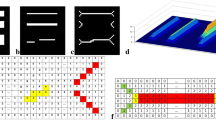Abstract
This paper is a continuation to the work in [1], in which a new algorithm for skeletonization is introduced. The algorithm given there and implemented for script and text is applied here on images like pictures, medical organs and signatures. This is very important for a lot of applications in pattern recognition, like, for example, data compression, transmission or saving. Some interesting results have been obtained and presented in this article. Comparing our results with others we can conclude that if it comes to thinning of scripts, words or sentences our method is as good as some of the latest approaches, when considering cursive script. However, when it comes to pictures, signatures or other more complicated images, our algorithm showed better and more precise results [6].
Access this chapter
Tax calculation will be finalised at checkout
Purchases are for personal use only
Preview
Unable to display preview. Download preview PDF.
Similar content being viewed by others
References
Saeed, K., Text and Image Processing: Non-Interrupted Skeletonization. Accepted for publication and presentation in WSES/IEEE-CSCCD1, World Scientific and Engineering Society Multi-Conference on Circuits, Systems, Communications and Computers, July 8–15. Crete, Greece (2001)
Saeed, K., Niedzielski, R.: Experiments on Thinning of Cursive-Style Alphabets. ITESB’99, Inter. Conf. on Information Technologies, June 24–25. Minsk (1999)
Yung-Sheng Chen: The Use of Hidden Deletable Pixel Detection to Obtain Bias-Reduced Skeletons in Parallel Thinning. Proceedings of 9th ICPR’96-IEEE, Vol. 1. Vienna (1996) 91–95
Zhang, Y.Y., Wang, P.S.P.: A Parallel Thinning Algorithm with Two-Subiteration that Generates One-Pixel-Wide Skeletons. Proceedings of 9th ICPR’96-IEEE, Vol. 2. Vienna (1996)457–461
Ososkov, G., Stadnik, A.: Face Recognition by a new type of Neural Networks. Proceedings of World Scientific and Engineering Society WSES-NNA’2001 Conf., WSES Press, February 12–14. Tenerife, Spain (2001) 304–308
Saeed, K.: New Approaches for Cursive Languages Recognition: Machine and Hand Written Scripts and Tests. Invited Paper in Proceedings of World Scientific and Engineering Society WSES-NNA’2001 Conf., WSES Press, February 12–14. Tenerife, Spain (2001) 304–308
Ghuwar, M., Skarbek, W.: Recognition of Arabic Characters-A Survey. Polish Academy of Science, Manuscript No.740. Warsaw (1994)
Hodun, A.: Signature Recognition. B.Sc. Thesis. Bialystok University of Technology, Bialystok, Poland (2001)
Saeed, K.: Three-Agent System for Cursive-Scripts Recognition. Proc. CVPRIP’2000 Computer Vision, Pattern Recognition and Image Processing-5th Joint Conf. on Information Sciences JCIS’2000, Vol. 2, Feb. 27–March 3. New Jersey (2000) 244–247
Saeed, K., Dardzińska, A.: Cursive Letters Language Processing: Muqla Model and Toeplitz Matrices Approach. FQAS’2000-4th Inter. Conference on Flexible Query Answering Systems, Oct. 25–27. Recent Advances, Springer-Verlag, Warsaw(2000) 326–333
Saeed, K.: A Projection Approach for Arabic Handwritten Characters Recognition. Proc. of ISCI-International Symposium on Computational Intelligence, Aug. 31–Sep. 1. New Trends and App. in Intelligence, Springer-Verlag, Kosice, Slovakia (2000) 106–111
Author information
Authors and Affiliations
Editor information
Editors and Affiliations
Rights and permissions
Copyright information
© 2001 Springer-Verlag Berlin Heidelberg
About this paper
Cite this paper
Saeed, K., Rybnik, M., Tabedzki, M. (2001). Implementation and Advanced Results on the Non-interrupted Skeletonization Algorithm. In: Skarbek, W. (eds) Computer Analysis of Images and Patterns. CAIP 2001. Lecture Notes in Computer Science, vol 2124. Springer, Berlin, Heidelberg. https://doi.org/10.1007/3-540-44692-3_72
Download citation
DOI: https://doi.org/10.1007/3-540-44692-3_72
Published:
Publisher Name: Springer, Berlin, Heidelberg
Print ISBN: 978-3-540-42513-7
Online ISBN: 978-3-540-44692-7
eBook Packages: Springer Book Archive




